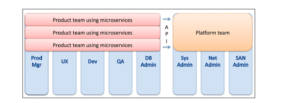The Lessons and Challenges of Managing Engineers with Ron Lichty

A common path for engineers is to become managers of other engineers. Engineering management requires a whole new set of skills outside of coding, debugging, and testing. In this episode, Ron Lichty, author of Managing the Unmanageable and thirty-year veteran of managing engineers at Apple, Fujitsu, and across the Fortune 100, talks about managing engineers.
Motivating unmotivated engineers
One of the most common issues new managers face is keeping engineers motivated. How do you keep an engineer interested in her work when it may be boring or uninteresting?
This is not a new problem for engineers, nor are the solutions. Lichty advises to focus on impact and acquiring value to keep engineers focused on task even when that may be a difficult ask.
By Impact
If the work is challenging due to lack of motivation, it’s important to have your engineers focus on the impact that their software is providing. This impact can be measured in a number of ways. For example, for Facebook it’s easy to point to the number of users impacted since their scale is in the billions.
Others may not be motivated by impact quantity, but by impact quality. In other words, instead of affecting millions or billions of faceless users, perhaps it’s more motivating to an engineer to deeply affect those on his team or the senior management. Be sure to work with your engineers to understand their underlying motivations and interests to maximize the perception of their impact.
“Tour of Duty”
When motivation by impact is ineffective, an alternative strategy for motivation is to focus on the values generated from the engineer’s “tour of duty.” This phrase, originally coined by Reid Hoffman with regards to the software engineering profession, recognizes that the tenure of an engineer is not like it used to be. It is becoming increasingly difficult to engage and retain talent since the average tenure of an engineer is less than two years.
Rather than fight upstream, Hoffman advises that you accept the inevitable and focus on what you can get out of an engineer during their tour of duty with your company. One can do this by focusing reflexively on the value and skills the engineer wants to attain over the course of your time together.
By approaching an engineer’s career with honesty and transparency, a manager can gain trust with his directs and ultimately reclaim that lost motivation.
Conflict and Resolution
Another extremely common requirement for managers is effective conflict resolution. It is also one of the most feared aspects of management; many engineers-turned-managers balk at the idea of having to resolve personal conflicts or issues between teammates.
Cohesion is critically important to running an effective organization. Additionally, conflict can arise in many forms. It can be something as simple as two architects arguing over a solution that may not have one true right answer. It can also be people issues with two engineers who have differing personal opinions on matters outside of the office. Either way, managers need to be prepared to face these issues with professionalism and decisiveness.
Opt for speed
One common tactic for dealing with conflicts is to delay a solution. “Sweeping problems under the carpet” or other evasive tactics rarely ever work. These can also be masked as suggestions to the engineer even if you know they are not the right fit for the team.
For example, if one of your engineers is a “brilliant jerk,” or someone extremely talented but difficult to work with on a team, it is rare that you can fundamentally change who they are. Instead, it is better to remove jerks quickly instead of letting the conflict drag on. We all want to believe the best in people, but we usually tend to let this linger for far too long. This can affect your relationships with your other engineers (and each other) because they must continue to deal with this difficult person.
Prepare for discomfort
So how do you have the difficult conversations with underperforming employees? Lichty offers a few suggestions for these anxiety-inducing interactions:
- Prepare. And then prepare some more. As an example, Lichty recalls a single conversation with a difficult employee took several days to prepare for with multiple people (including HR). In harrowing situations, it never hurts to prepare for anything.
- Focus on behaviors and impacts. Instead of making the problems about the person or their emotions, focus on the tangible impacts and behaviors that lead to underperformance for the individual or the team. Separating the person from the problem is the best way to not offend or attack your engineers.
- Learn from the best. Books such as Managing Difficult People and The 27 Challenges Managers Face are great case studies in problems you are likely to see when dealing with conflicts and how to resolve them.
Managing productivity and burnout
Another concern among managers is managing productivity and burnout. Productivity can come in waves, especially at startups, with certain periods of excessive hours in the office followed by relatively quiet periods. Keeping an effective and healthy pace is critical to preventing burnout and attrition. Lichty advises to focus on outcomes, remove distractions, and make work fun to thwart issues with productivity.
Singular focus
Interruptions and multitasking have a huge cost an an engineer’s ability to be productive. It is better to stay singularly focused on one task than to try and balance lots of goals and projects. If you are an engineering manager, don’t stack excessive goals on top of an engineer’s day-to-day work. Instead, see how you can integrate a high-level personal or career goal with the work they are already doing so that their career development serves as a guiding light in their daily work instead of another thing to self-manage.
20% Time and work-life balance
One tactic that has been famous for the last decade is Google’s concept of 20% Time, where engineers are allowed to work on whatever they want for one day a week. Lichty approves of this tactic but the important thing is not the tactic itself, but about organizations figuring out what works for the individuals to make work fun.
Engineers face a great deal of pressure to be sprinting all of the time (no surprise given that Agile has something at its core called a “sprint”). The truth is that business, even for startups, is more like a marathon than a sprint. Therefore, it makes sense to design work-life balance around a sustainable marathon pace rather than trying to sprint all of the time to prevent burnout and unhealthy work environments.
Effective management strategies
So how do engineers make the first leap into management without seeming like they’ve betrayed their programming roots? How can engineers set the example even when they are no longer coding? Consider the following:
Collaborate to set an example
Being an exemplar without doing the work of your previous individual contributions boils down to the culture you create, both as a manager and as an entire team and the key values you share. The most effective way to do this is by being collaborative both as a person and as a team. One way to start is by studying self-organizing teams. Spotify offers a great example of how teams can self-organize to satisfy the greater good of the entire company.
Prefer over-communication
Trust and respect are the bedrock of any organization. These things are what ultimately convinces people to do what you want them to do. One example where this is often mismanaged is with annual performance reviews. Have you ever been pressured by your boss to perform at a high level and hit deadlines, all to have your performance review delayed by several days or weeks? These kinds of critical errors in management erode trust and set a bad example of “do as I say not as a I do” thinking.
Instead, leaders must set the example by living up to their own standards. Only by living our ideals can we hope to persuade others to do the same.
Success at one level may not carry over to the next
Lastly, it’s important not to rest on your laurels and assume that what you learn now will be effective when you are given more responsibility and stop striving for further success. For example, it is extremely important as an individual contributor to shut out distractions and maintain laser focus when delivering critical work. Conversely, that same person as a manager needs to do the complete opposite: She must offer the proverbial welcome mat and be open to interruptions.
The most effective managers are willing to radically adapt to a completely different set of skills than what they acquired as individual contributors. If you’re a new manager or you’re accepting more responsibility as a manager, having the courage to learn something new or drop old habits is vital to your career growth and development.






















